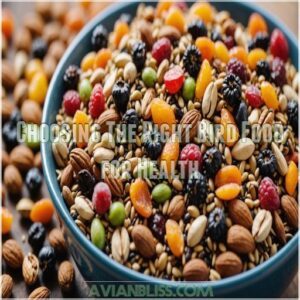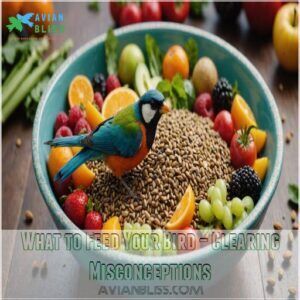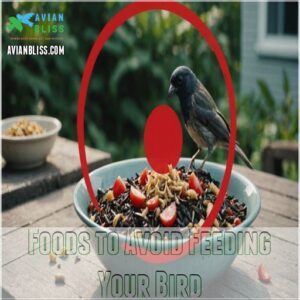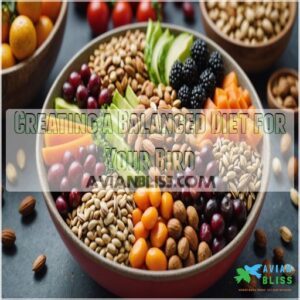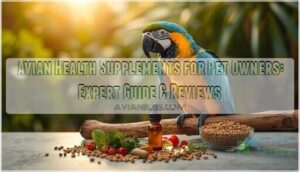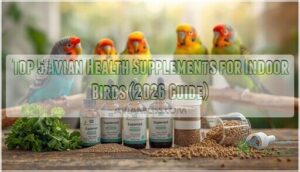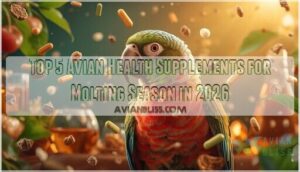This site is supported by our readers. We may earn a commission, at no cost to you, if you purchase through links.
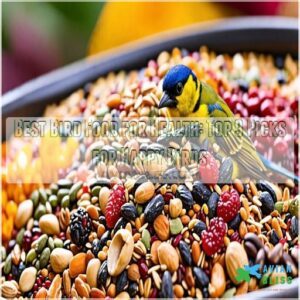
A mix of pellets, seeds (for healthy fats), fruits (vitamins!), and veggies (fiber) is key. Brands like ZuPreem and Lafeber’s offer great options.
Remember, seeds alone aren’t enough; they’re like the dessert, not the whole meal. Avoid avocados and chocolate – they’re toxic to birds! Getting the right balance is essential for a happy, healthy feathered friend.
Want to know more about creating the perfect bird menu? We can help you with that.
Table Of Contents
- Key Takeaways
- Choosing The Right Bird Food for Health
- Top 9 Best Bird Food for Health
- 1. ZuPreem Bird Food for Medium Birds
- 2. Lafebers Nutri Berries Parakeet Bird Food
- 3. Lafeber’s Tropical Fruit Bird Food
- 4. Organic Bird Food High Potency Fine
- 5. Organic Parrot Food Pellets for Hookbills
- 6. Kaytee Rainbow Parrot Conure Food
- 7. Pennington Songbird Nut Fruit Blend
- 8. Kaytee Parrot Bird Food 8 Pound
- 9. Kaytee Conure Lovebird Health Food
- What to Feed Your Bird – Clearing Misconceptions
- Foods to Avoid Feeding Your Bird
- Creating a Balanced Diet for Your Bird
- Frequently Asked Questions (FAQs)
- What type of bird food should I feed my bird?
- Is chicken good for health?
- What is a good food for wild birds?
- How can a healthy diet help a bird?
- What is the healthiest thing to feed birds?
- What is the healthiest bird seed?
- What is the best bird food for backyard birds?
- What is the best nutrition for birds?
- How do I store bird food safely?
- What are the signs of poor nutrition in birds?
- Can different bird species eat the same food?
- How often should I change my birds diet?
- What supplements can improve bird health?
- Conclusion
Key Takeaways
- Mix pellets, seeds, fruits, and vegetables for a balanced bird diet. Avoid a seed-only diet as it’s like serving dessert without the main meal.
- Be cautious of toxic foods like avocados and chocolate, which can harm your bird.
- To keep your bird engaged, vary their diet and include foraging opportunities with safe fruits and veggies.
- Consult an avian vet for guidance, especially if trying new supplements or diet changes.
Choosing The Right Bird Food for Health
To make sure your bird gets all the essential nutrients, you’ll want to emphasize variety in their diet.
Variety can keep them in tip-top shape while keeping mealtime anything but boring.
Mixing pellets, seeds, fruits, and vegetables can keep them in tip-top shape while keeping mealtime anything but boring.
Importance of Variety in Bird Diets
Offering variety in your bird’s diet is essential for keeping their gut health in check and ensuring mental stimulation.
Mixing different bird food caters to their nutritional needs and food preferences.
Like a gourmet buffet, the right parrot diet includes seeds, fruits, and foraging benefits, helping your feathered friend stay healthy and engaged.
Nutritional Benefits of Different Food Types
Understanding what wild birds eat, such as seasonal bird diets, is essential to selecting the right foods that meet their nutritional needs. Understanding the nutritional benefits of bird food types is key to keeping your feathered friends healthy.
Parrot food options like seeds provide essential fats and proteins, while fruits offer important vitamins, boosting overall avian nutrition.
Veggie power comes from fiber-rich vegetables, supporting digestion.
Pellets bring value, offering a balanced diet through parrot pellets or extruded diets, enhancing parrot nutrition effectively.
Avoiding Common Mistakes in Bird Feeding
Choosing a balanced bird food like pellets, which should make up 50-70% of a bird’s daily intake and guarantee nutritional balance, boosts bird nutrition, but watch out for pitfalls like overfeeding and seed-only diets.
Spoiled food impacts bird health, so check freshness.
Make sure water quality is excellent—birds need clean water.
Avoid toxic treats that harm them.
Consult an avian veterinarian for guidance on a balanced bird diet.
A balanced diet with treats like hard cheese in moderation keeps your feathered friends happy!
Top 9 Best Bird Food for Health
You want your feathered friend to be healthy and happy, so choosing the right bird food is essential.
We’ve gathered a list of the top nine options that combine essential nutrients with flavors they’ll love.
1. ZuPreem Bird Food for Medium Birds
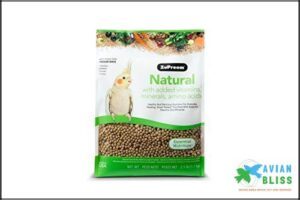
ZuPreem’s food for medium birds might be your answer if you want a healthy, happy medium-sized bird.
It’s formulated with essential vitamins, minerals, and amino acids.
This pellet-based food provides a balanced diet, forming at least 60% of your bird’s daily intake.
Suitable for Cockatiels, Quakers, Lovebirds, and small Conures, it offers a variety of flavors like VeggieBlend and PastaBlend.
Remember, always provide fresh water and adjust the amount based on your bird’s needs.
While some birds may prefer seeds, ZuPreem offers a nutritious alternative to an all-seed diet.
However, be aware of ingredients like sugar and corn.
Best For: ZuPreem’s food for medium birds is best for owners of Cockatiels, Quakers, Lovebirds, and small Conures who are looking for a healthy and nutritious pellet-based food for their birds. As a nutritious option, ZuPreem FruitBlend Pellets offer a balanced diet with a mix of fruits like bananas and oranges, meeting the nutritional needs of picky eaters.
- Provides a balanced diet with essential vitamins, minerals, and amino acids.
- Offers a nutritious alternative to an all-seed diet.
- Made with fresh, wholesome, natural ingredients.
- Some birds may prefer seeds and not eat the pellets as much.
- Contains sugar and corn, which can be unhealthy for birds and may contribute to obesity.
- May not be suitable for all birds.
2. Lafebers Nutri Berries Parakeet Bird Food
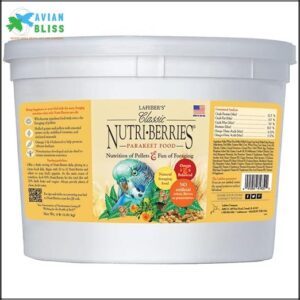
Lafeber’s Nutri Berries Parakeet Bird Food, which includes nutritious ingredients like millet that provide essential amino acids and complex carbohydrates for optimal avian health, could be a great millet source. Lafeber’s Nutri Berries Parakeet Bird Food could be your feathered friend’s new favorite!
These uniquely shaped food pieces promote foraging, satisfying your parakeet’s natural instincts while providing a nutritionally complete meal with omega-3 and 6 fatty acids for vibrant feathers.
Made from human-grade, non-GMO ingredients, they’re designed to deliver essential nutrients in a fun, engaging way.
Some bird owners report needing to crush them for easier beak action, but many avian vets recommend them as a healthy treat or part of a balanced diet.
Best For: This food is best for parakeet owners looking for a nutritionally complete, fun, and engaging food option that encourages natural foraging behavior.
- Encourages foraging, satisfying natural instincts
- Contains omega-3 and 6 fatty acids for vibrant feathers
- Made with human-grade, non-GMO ingredients
- Some users report receiving crumbled or crushed berries
- Price has increased significantly in recent years
- May need to be crushed for some parakeets
3. Lafeber’s Tropical Fruit Bird Food
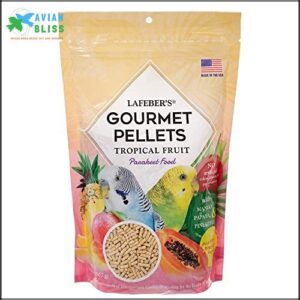
Imagine your feathered friend’s delight as they savor Lafeber’s Tropical Fruit Bird Food, a tasty journey to the tropics.
These pellets, made with real mango, pineapple, and papaya, pack a nutritional punch without added sugars.
Over 99% non-GMO, they support energy and immune health with omega 3 and 6, plus essential vitamins.
Birds often prefer them moistened or mixed with seeds.
Remember, while nutrient-rich, a balanced diet including fresh produce and seeds is essential for overall health.
Best For: Lafeber’s Tropical Fruit Bird Food is best for bird owners who want a nutritious and flavorful food option for their feathered companions.
- Made with real, human-grade fruit pieces.
- Over 99% non-GMO.
- Contains essential vitamins and omega 3 and 6 for energy and immune support.
- Some birds may prefer the pellets moistened or mixed with seeds.
- Not recommended for birds sensitive to fruit.
- Should not be the only food source for your bird.
4. Organic Bird Food High Potency Fine
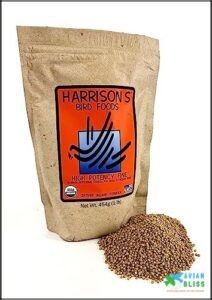
Organic Bird Food High Potency Fine from Harrison’s is ideal for providing your feathered friend with a nutritious diet.
This certified organic blend combines grains and legumes, supporting birds during molting, breeding, or illness recovery.
Its protein-packed ingredients like hulled millet and sunflower kernels help your bird get essential nutrients for a healthy lifestyle.
Not just for special needs, this food is great for conversion to pellet diets too.
Remember, keep this high-quality mix refrigerated or frozen to maintain freshness!
Best For: This is great for small to medium-sized birds, especially those transitioning to a pellet diet, during molting, breeding, or recovery from illness.
- Certified organic and non-GMO
- Versatile formula for various bird needs
- Protein-packed ingredients for essential nutrients
- May require gradual conversion for birds used to seed diets
- Short shelf life after opening
- May be more expensive than some other bird food options
5. Organic Parrot Food Pellets for Hookbills
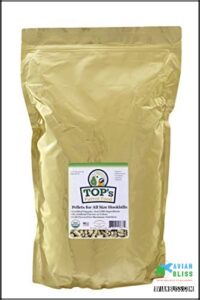 View On Amazon
View On Amazon Looking for the best organic bird food pellets that are USDA-certified and packed with wholesome ingredients, such as premium organic bird food options, for your hookbill?
These pellets are packed with fresh, natural ingredients like organic carrot powder and hulled millet, providing essential vitamins and minerals.
They’re cold-pressed to preserve nutrients without artificial colors or preservatives.
You won’t find any fillers here, just nutrition dense enough to keep your bird chirping happily.
Some parrots can be picky eaters, so introducing these pellets with a mix of other foods might work best to minimize waste and guarantee a balanced diet.
Best For: These pellets are best for large and medium parrots, like macaws, amazons, eclectus, and cockatoos.
- Made with fresh, natural ingredients.
- No fillers, artificial colors, flavors, or preservatives.
- Cold-pressed to preserve nutrients.
- Some parrots may be picky eaters.
- Pellets may powder a lot, leading to waste.
- Some users have reported the pellets becoming hard and difficult to eat.
6. Kaytee Rainbow Parrot Conure Food
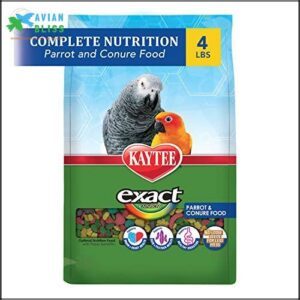
Kaytee Rainbow Parrot Conure Food could be just what your bird needs for a bit of pep in its step.
This extruded food focuses on exact nutrition, ensuring vibrant feathers and better overall health, thanks to Omega 3s, prebiotics, and probiotics.
Consider that it might be too large for smaller birds and there are concerns about packaging.
Despite that, many birds seem to relish these colorful nuggets, adding a vibrant splash to their daily diet.
Best For: Kaytee Rainbow Parrot Conure Food is best for larger parrots and conures who need a balanced, nutritionally complete diet.
- Provides essential nutrients like Omega 3s, prebiotics, and probiotics for overall health.
- Enhances vibrant plumage and feather health.
- 100% consumable with no shells or seed hulls.
- May be too large for smaller birds.
- Some customers have concerns about potential chemical contamination in the packaging.
- Some customers report difficulty in getting their birds to transition to this food.
7. Pennington Songbird Nut Fruit Blend
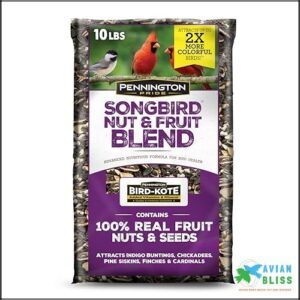
When you want to treat your feathered friends, the Pennington Songbird Nut Fruit Blend is a solid choice.
This blend, brimming with real fruit, nuts, and seeds, provides a balanced diet with added vitamins.
It attracts an array of delightful birds, including cardinals and chickadees, ensuring your backyard becomes a songbird haven.
While it’s messy and may tempt squirrels, its fresh scent and economic value make it worthwhile.
Perfect for multiple feeders, this blend keeps your birdwatching lively.
Best For: Bird lovers seeking a balanced and nutritious blend to attract a variety of songbirds.
- Attracts a wide range of songbirds.
- Offers a balanced diet enriched with vitamins and nutrients.
- Provides a fresh scent and economic value.
- Can be messy with seeds scattered on the ground.
- May attract squirrels, chipmunks, and doves.
- High millet content may attract larger birds, potentially deterring finches.
8. Kaytee Parrot Bird Food 8 Pound
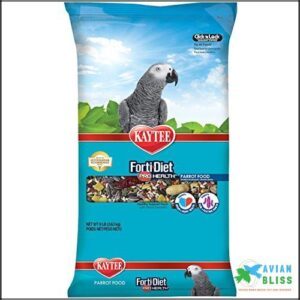
Kaytee Parrot Bird Food offers a blend of seeds, grains, and supplements in an 8-pound bag.
It’s fortified with Omega-3s for heart and brain health, and antioxidants boost immunity.
This veterinarian-recommended food provides varied textures and nutrients, including prebiotics and probiotics for digestion.
However, remember some birds are picky eaters, and storage is essential to prevent moth infestations.
A green-wing parrot might find an 8-pound bag lasts over a month.
The ingredient list is extensive, including seeds, grains, and various supplements.
Note that a recall occurred for one lot of a similar Kaytee product.
Best For: This food is best for parrot owners looking for a nutritionally complete and veterinarian-recommended diet.
- Contains prebiotics and probiotics for digestive health.
- Rich in natural antioxidants for general health and immune support.
- Includes pieces to support skin and feather health.
- Some parrots may be picky eaters and may not eat all of the ingredients.
- The product may get infested with moths.
- A recall occurred for one lot of a similar Kaytee product.
9. Kaytee Conure Lovebird Health Food
Imagine feeding your conure or lovebird a meal that checks all the boxes for health and vitality.
You can find a variety of Finch Food products that support overall health at Finch Food Health stores like Finch Food Health products.
Kaytee Conure Lovebird Health Food is exactly that, offering omega-3s for brain and heart health, alongside probiotics for digestion.
This food supports feather health and is veterinarian-recommended.
However don’t rely solely on it; supplementing with fresh fruits and vegetables is essential.
If your bird’s a picky eater, patience and persistence can work wonders in expanding their diet.
Best For: This food is best for conures and lovebirds who need a balanced diet with added health benefits.
- Supports brain and heart health with omega-3s.
- Enhances skin and feather health for vibrant plumage.
- Provides a variety of seeds and ingredients for a balanced diet.
- Some birds may be picky eaters and may not enjoy all the ingredients.
- It is important to provide fresh fruits and vegetables in addition to this food.
- This is not a complete diet and should be supplemented with other foods.
What to Feed Your Bird – Clearing Misconceptions
Regarding feeding your feathered friend, there are plenty of myths that can lead you astray.
You might think all birds thrive on just seeds or pellets, but offering a balanced mix of fruits, veggies, and proteins is essential for their health.
Fruits and Vegetables for Birds
Feeding birds fruits and veggies is important for their health, but some folks might think anything will do, but it’s great to know that specific options like pumpkin seeds benefits. Feeding birds fruits and veggies is important for their health, but some folks might think anything will do.
However, not all produce is bird-safe.
Here’s a quick guide:
- Fruits: A balanced diet with essential vitamins for bird health like Vitamin A from carrots helps maintain vibrant feathers. Offer apples, bananas, and berries for bird vitamins.
- Veggies: Carrots and broccoli provide bird minerals.
- Safety: Avoid avocados and onions.
- Preparation: Wash and cut appropriately.
Stay seasonal and varied!
Protein Sources for Birds
Once you’re satisfied with your bird’s fruit and veggie intake, focus on protein sources for birds.
Parrot protein needs are unique; plain scrambled or boiled eggs, sprouted legumes like mung beans, and tofu are excellent choices.
Protein for young birds supports growth, while older birds need it in moderation to avoid health issues.
Seed and Nut Options for Birds
Switching gears from protein sources, you’ll appreciate the nutty nuances of sunflower seeds and safflower seeds, which can be found in various healthy bird food options available at Healthy Bird Food Stores.
These are packed with nutritional punch, fueling your bird with healthy fats.
But be cautious: seeds alone can’t cut the mustard for complete nutrition.
Keep them stored properly to maintain freshness, and balance nut ratios to make sure shell safety for happier, healthier feathered friends.
Foods to Avoid Feeding Your Bird
In terms of feeding your bird, knowing what to avoid is just as important as knowing what’s best.
Be cautious with foods like chocolate and avocado, as they can be hazardous to your feathered friend’s health.
Toxic Foods Like Avocado and Chocolate
So, you’ve learned about healthy bird foods. Now, let’s talk about what to avoid. Some foods are downright dangerous! Keep these toxic treats away from your feathered friends: It’s also essential to be aware of other Deadly Bird Food Hazards that can harm your bird’s health.
- Avocado: Contains persin, **toxic to birds*** Chocolate: Highly toxic due to theobromine.
- Onions and garlic: These can cause anemia.
- Caffeine: Avoid coffee, tea, and soda.
- Alcohol: Never give your bird alcoholic beverages.
Remember, Bird food safety is key to a happy, healthy bird!
Common Household Foods to Avoid
Watch out for onions, garlic, and salt when feeding your feathered friend.
These common kitchen staples can lead to onion danger and garlic risks, causing anemia and weakness.
Even a salty chip might throw off their delicate electrolyte balance, resulting in salt concerns.
Stick to healthier bird snacks, avoiding bread that can cause malnutrition and metabolic disorders, learn more about the harmful effects of bread, ensuring your pet bird enjoys safe bird food without harmful processed foods.
Foods That Cause Allergic Reactions in Birds
Bird allergies can be tricky, so be cautious with what you feed them.
If you’re unsure about your parrot’s diet, consider consulting a veterinarian or exploring healthy parrot food options at a parrot food health store Parrot Food Health.
Some foods that often cause allergic reactions include:
- Avocado: Contains persin, potentially causing breathing issues.
- Chocolate: Toxic to birds, leading to seizures.
- Onions and Garlic: Can damage blood cells and organs.
- Uncooked Beans: Contain harmful substances that can upset their digestion.
Creating a Balanced Diet for Your Bird
Creating a balanced diet for your bird isn’t just about tossing in seeds and pellets.
It’s important to mix in fresh fruits and vegetables for good health.
You can add variety with wild and foraged foods, ensuring your bird stays both healthy and happy.
Combining Pellets, Fruits, and Vegetables
Feeding your bird a safe, balanced diet keeps them chirpy and strong.
Mixing pellets with fresh fruits and veggies daily makes sure nutritional blast-offs!
It’s like a rainbow of flavors on their plate—maintaining freshness with ripe produce is key.
For instance:
| Food Type | Portioning | Ideal Frequency |
|---|---|---|
| Pellets | 80% | Daily |
| Fruits | 10% | Few times/week |
| Vegetables | 10% | Few times/week |
Enjoy crafting these vibrant meals!
Adding Variety With Wild and Foraged Foods
A balanced mix of seeds, fruits, insects, and small animals for protein is crucial for your bird’s diet to flourish with wild and foraged foods, providing essential nutrients and excitement.
A balanced diet also includes a mix of fresh fruits and vegetables, formulated diets, and seeds in moderation, as discussed in the avian diet guide.
Make sure foraging safety by considering:
- Wild food risks: Know what’s safe to offer.
- Local foraging: Source plants nearby.
- Bird-safe plants: Choose non-toxic plants.
- Seasonal foraging: Adapt to nature’s rhythms.
This homemade approach enriches bird care and supports backyard birds.
Tips for Rotating Foods and Avoiding Boredom
Switching things up can keep your feathered friend delighted and healthy.
Food rotation strategies make sure variety is key in their diet, combining parrot or cockatiel food with fresh options.
Bird foraging toys are great enrichment tips, turning mealtime into playtime.
These healthy boredom busters make sure your lovebird or conure won’t lose interest or nutrients.
Frequently Asked Questions (FAQs)
What type of bird food should I feed my bird?
Mixing seeds, pellets, and fresh fruits and veggies provides a balanced diet for pet birds.
Avoid processed treats; instead, offer occasional sprouted seeds for added nutrients.
This approach promotes better health and vibrant plumage.
Is chicken good for health?
Picture a medieval feast; chicken remains a healthy choice today, packed with protein and nutrients like niacin and selenium.
Chicken is a healthy choice today, packed with protein and nutrients like niacin and selenium.
Choose grilled, baked, or stir-fried chicken over fried versions to maintain heart health and support weight management.
What is a good food for wild birds?
Black-oil sunflower seeds are great for wild birds.
They’re high in fat, providing essential energy, especially during colder months.
Plus, they’re small and easy for birds to handle, making them a favorite among many species.
How can a healthy diet help a bird?
A healthy diet boosts your bird’s immune system, keeps feathers vibrant, and promotes overall well-being.
It reduces infection risk and supports a longer lifespan.
Think of it as giving your feathered friend a life full of joy.
What is the healthiest thing to feed birds?
You might think bird seeds are just seeds, but did you know fresh, organic sprouting blends are the healthiest option?
Sprouting blends provide essential proteins, vitamins, and nutrients that your feathered friends need for a balanced diet.
What is the healthiest bird seed?
Sunflower seeds are a fantastic all-around choice, packed with nutrients. For finches, try nyjer seeds. Avoid fillers like red millet; they’re mostly wasted. Consider offering peanuts, but keep them dry.
What is the best bird food for backyard birds?
To attract backyard birds effectively, offering the right food is crucial, especially during migrations, as seen in the diverse backyard birds of New York, and offer a variety of seeds like black oil sunflower, nyjer, and peanuts in separate feeders.
This combination satisfies diverse species while minimizing waste.
Ensure a lively birdwatching experience right in your yard.
What is the best nutrition for birds?
Birds thrive on a balanced diet of pelleted food, fresh vegetables, and fruits.
Pellets should make up 60-80% of their diet, with vegetables and a small amount of fruit daily for the best health and happiness.
How do I store bird food safely?
Store bird food in a cool, dry place.
Use airtight containers to keep out insects and rodents.
Avoid mixing old with new seed.
Discard any that smells foul or looks moldy to maintain freshness.
What are the signs of poor nutrition in birds?
Watch for dull feathers, flaky skin, and overgrown beaks as signs of poor nutrition.
Birds may also display lethargy, unusual droppings, or weight changes, signaling potential nutritional deficiencies that require dietary adjustments for improved health.
Can different bird species eat the same food?
Think of a buffet where different diners enjoy the same dishes.
Many bird species can eat similar foods like fruits and grains.
Specific nutritional needs vary, so make sure their diets meet unique species requirements for good health.
How often should I change my birds diet?
Gradually change your bird’s diet over 7 to 10 days to prevent digestive issues.
Start with 75% old food and 25% new, adjusting daily.
Monitor their intake.
Slow changes help them adjust and maintain health.
What supplements can improve bird health?
To boost your bird’s health, consider supplements like vitamin E for immunity, calcium with vitamin D3 for bone strength, and a balanced vitamin mix for overall well-being.
Always consult an avian vet before starting supplements.
Conclusion
Think of crafting your bird’s diet like composing a symphony, where each note—seeds, fruits, veggies, and pellets—has its part in creating harmony.
By choosing a balanced mix of macronutrients like proteins, carbohydrates, and fats, as outlined in this avian nutrition guide for beginners, you set the stage for a vibrant, happy life for your feathered friend. By incorporating essential ingredients like black oil sunflower seeds and white millet found in a small bird food mix, you can create a nutritious diet for your backyard birds. By choosing the best bird food for health, such as ZuPreem or Kaytee, and adding natural bird food supplements like calcium-rich powders to fill nutritional gaps, you set the stage for a vibrant, happy life for your feathered friend.
Avoid toxic foods like avocados and diversify their diet to prevent boredom.
With balanced nutrition, your bird stays healthy and chirpy, ready to bring joy with every tweet.

